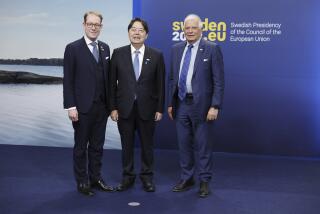Dealing With Japan as a ‘Normal’ Nation
- Share via
Japan’s moves toward forming a new government after Prime Minister Keizo Obuchi’s stroke were swift and unexpected. Now Japan’s neighbors again face uncertainty about what its foreign and domestic policies will be, raising many questions that have troubled outsiders for nearly half a century.
Although World War II seems increasingly remote, we remain undecided about the appropriate roles in international affairs of what the U.N. Charter called “enemy states.” Although the winners eschewed a punitive peace, they did impose on Germany and Japan still-valid constitutional limits on the use of military force. These limits are now particularly vexing, given both nations’ enormous economic strengths and successful transitions to “normal” democracies.
It is precisely the enormous disparity between their economic clout and their military weakness that catalyzes the debate, within Japan and Germany as well as among outsiders, about what their proper roles should be. Are we perhaps afraid that democracy is not so well-rooted as it appears in both countries and that militarism or fascism might emerge? Should “normal” countries not take as much responsibility for their own self-defense, and their collective obligations to their alliance partners, as their economies warrant? From the perspective of their allies, many ask: Are Germany and Japan “free riders,” benefiting from the protection of American-led alliance systems without equitably bearing the burdens?
At least superficially, Germany appears to be the easier case. Locked into NATO and the European Union, Germany’s scope for truly independent politico-military action appears to be insignificant. The Warsaw Pact threat is history, and no one now proclaims more loudly than Germans that they are Europeans, and that the EU is “a state under construction.” For many Germans, the hope is that the role of military force in international affairs is fading, to be replaced by comfortable legal structures and institutions that will never again confront them with the choice between distasteful war and unsatisfactory peace.
Many in Japan share this aspiration. Unfortunately, even the passing decade has been one of conflict, starting with the Persian Gulf War, continuing through the emergence of two new nuclear states, Pakistan and India, and concluding with wars in the former Yugoslavia and Chechnya.
For Japan, the best reminder of the proximity of military conflict is the divided Korean Peninsula. North Korea has tested ballistic missiles that can reach every major Japanese city, and no one discounts the possibility that the North has, or soon will have, weapons of mass destruction. Not far away, Taiwan is locked in a tense confrontation with China.
Unlike Germany, not only does Japan abide in a more threatening environment, it lacks a real framework of alliances in which to ground its ambitions and quiet its neighbors’ fears and memories. These memories in Korea, China and other parts of Asia are rawer than those in Europe, and uncertainties are closer to the surface. The U.S.-Japan alliance--including the enhanced joint defense guidelines that the Japanese parliament recently has legislated, and theater missile defense systems--is thus an important stabilizing and reassuring factor in East Asia. But the new guidelines are ambiguous on many key points, particularly involving hostilities around Taiwan.
Serious Japanese strategic thinkers have become more public in discussing Japan’s options. Much of the concern motivating Japanese politicians in particular is the realization that Chinese economic reforms and the growing prospects of Korean reunification, combined with Japan’s lengthy inability to recover fully from the collapse of the “bubble economy,” mean that Japan’s pre-eminence in Asia is no longer unquestioned. These concerns explain in part Japan’s willingness to enhance defense cooperation with the U.S. and its consideration of more independent military capabilities. Especially during President Clinton’s embrace of China, Japanese leaders have feared that the U.S. was shifting from “Japan bashing” on trade matters to “Japan passing” or even “Japan nothing,” not only on trade but also on key politico-military issues.
Japanese fears of shifting American allegiances and the consequent Japanese stirrings have aroused concerns elsewhere in Asia about Japan’s future regional role. From the U.S. perspective, these factors all counsel for remaining intensely involved in Asia, including strengthening existing defense commitments and alliances. While the end of the Cold War reduced overall military tensions in Europe, in Asia they may be reemerging along historical lines, for good or ill. Accordingly, careful reflection and planning now concerning Japan’s changing role can only pay dividends later.
More to Read
Sign up for Essential California
The most important California stories and recommendations in your inbox every morning.
You may occasionally receive promotional content from the Los Angeles Times.













